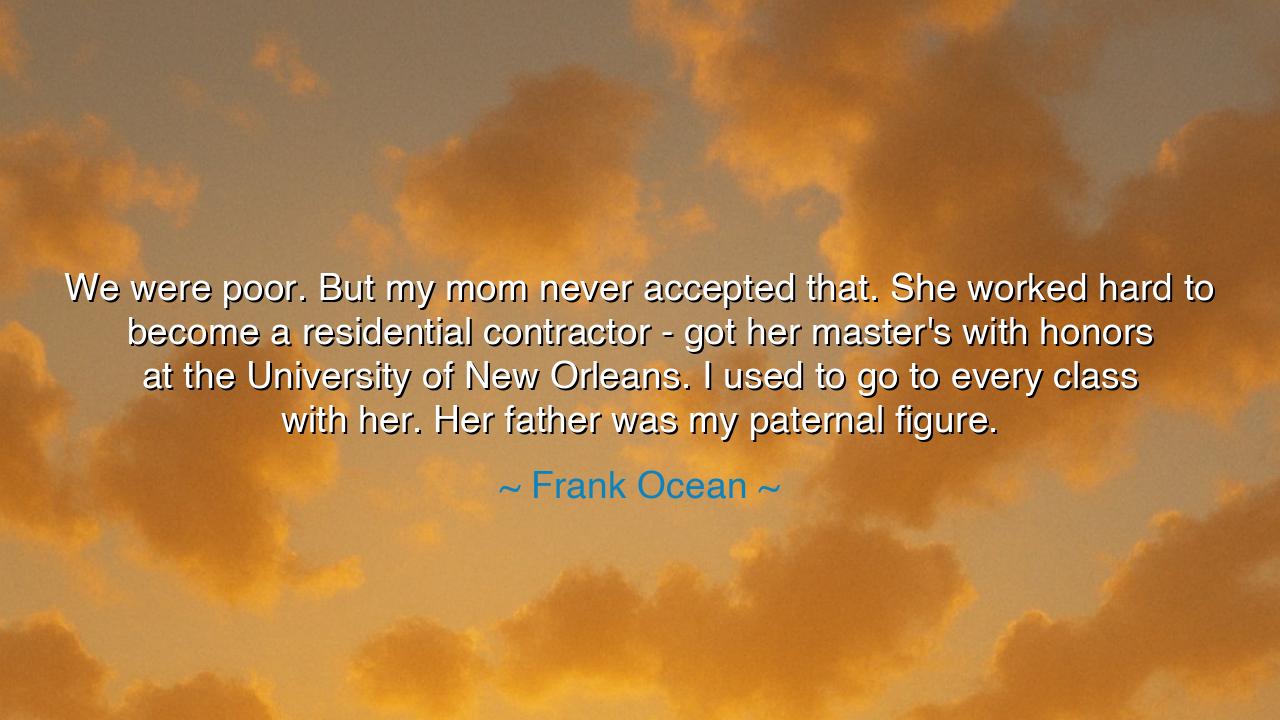
We were poor. But my mom never accepted that. She worked hard to
We were poor. But my mom never accepted that. She worked hard to become a residential contractor - got her master's with honors at the University of New Orleans. I used to go to every class with her. Her father was my paternal figure.






The poet of sound and soul, Frank Ocean, once spoke these humble yet profound words: “We were poor. But my mom never accepted that. She worked hard to become a residential contractor—got her master’s with honors at the University of New Orleans. I used to go to every class with her. Her father was my paternal figure.” Beneath this recollection lies not just a memory, but a testament to resilience, a hymn to the power of a mother’s will and the inheritance of perseverance that shapes a child’s spirit. In these words, Frank Ocean speaks of the alchemy of hardship, of how love, sacrifice, and faith can transform poverty into strength, and struggle into destiny.
The origin of this quote rests in Ocean’s own life—his beginnings in Long Beach, California, and later New Orleans, where his mother, Katonya Breaux, raised him largely on her own. Their family did not have wealth, yet they possessed something rarer and far greater: determination. When he says, “My mom never accepted that,” he means she refused to be defined by circumstance. Poverty was their condition, but not their identity. She fought not only for her own better life, but for the future of her son, showing him that dignity is not given—it is built, day by day, through labor and self-belief.
In his words, there echoes a truth known since the dawn of time: that the strength of a parent can become the foundation upon which a child’s greatness is raised. His mother, by earning her degree and mastering her craft, became both warrior and teacher. She embodied the ancient wisdom that poverty of the pocket need not mean poverty of the spirit. And by bringing her son to class, by allowing him to witness her struggle and triumph, she passed down more than education—she passed down an example, a living legacy of perseverance. In those classrooms, young Frank did not only see books and professors; he saw his mother’s unyielding hope, carved against the odds.
This story finds kinship with countless others across history. Consider Booker T. Washington, born into slavery, who walked hundreds of miles to attend school, sleeping under benches and working menial jobs to afford his education. Like Ocean’s mother, he refused to accept the limits imposed upon him. From the soil of deprivation, he grew into a man of immense wisdom, founding Tuskegee Institute and becoming a guiding light for generations. Such stories remind us that circumstance is not destiny—that those who labor in faith can rise above even the harshest conditions.
Frank Ocean’s words also hold a deeper emotional current—the acknowledgment of surrogate love, the quiet presence of his grandfather, whom he names as his “paternal figure.” In that relationship, we glimpse another timeless truth: that family is not always defined by blood, but by care. When the father is absent, the grandfather, uncle, or elder may step forward, filling the space where guidance is needed most. The ancients would call this the law of succession in spirit—that when love is missing, the universe sends another to ensure that the flame is never extinguished. Thus, Frank’s life, like his art, was shaped by a trinity of strength—his mother’s will, his grandfather’s steadiness, and his own determination to carry their legacy forward.
In this quote, the music of humanity plays softly yet powerfully: the rhythm of labor, the melody of love, the harmony of generations striving toward the light. It teaches that poverty cannot chain the soul that chooses to rise. The true inheritance of a child is not wealth, but the example of perseverance—the sight of someone they love refusing to surrender. And so, Frank Ocean’s story becomes not just his own, but a universal parable: that greatness is often born from those who first refused despair.
The lesson is clear and enduring: never let your circumstances dictate your worth. Whether you are rich or poor, known or forgotten, your power lies in how you respond to life’s trials. If hardship finds you, let it sharpen your resolve, not dull your spirit. If you have children, let them see your effort—your struggle, your hope, your persistence—for it is through example, not words, that they learn the meaning of strength.
Thus, as Frank Ocean reminds us, one must never “accept” poverty—not because wealth is the goal, but because surrender is the enemy. A heart that believes, a mind that learns, and hands that labor with purpose—these are treasures no hardship can take. So, remember this truth: that love in action is the greatest inheritance, and that those who rise from little often rise the highest, carrying with them not only their dreams, but the dreams of all who came before.






AAdministratorAdministrator
Welcome, honored guests. Please leave a comment, we will respond soon